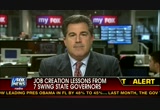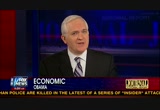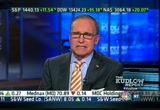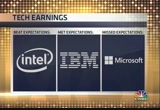they deserve. >> this is the big mega theme that romney is developing, focused on the economy, nationally based, not regionally based. i thought that was his most effective answer in that debate. >> oh, i did, too. i think it was the megaissue. i think that fellow put his finger right on it. how can we relate my economic life, my daily life, to what's going on in the larger economy? and president obama virtually had nothing to say to him. by the time he was done, he was talking about ending the war in iraq and killing bin laden. >> don't forget, but 100,000 -- >> right. >> the romney critique, the litany of obama broken promises that he went through, that was the best part of the debate. i would like to see romney do a little more explaining why liberating the economy, simplifying the tax code, creates jobs, a little bit more about why freedom works better than the government. in terms of knocking down the obama's claims, and he correctly pointed out that the obama has cut energy production on federal lands, and he scored. >> it's interesting to me that the romney campaign has this large nation


















































